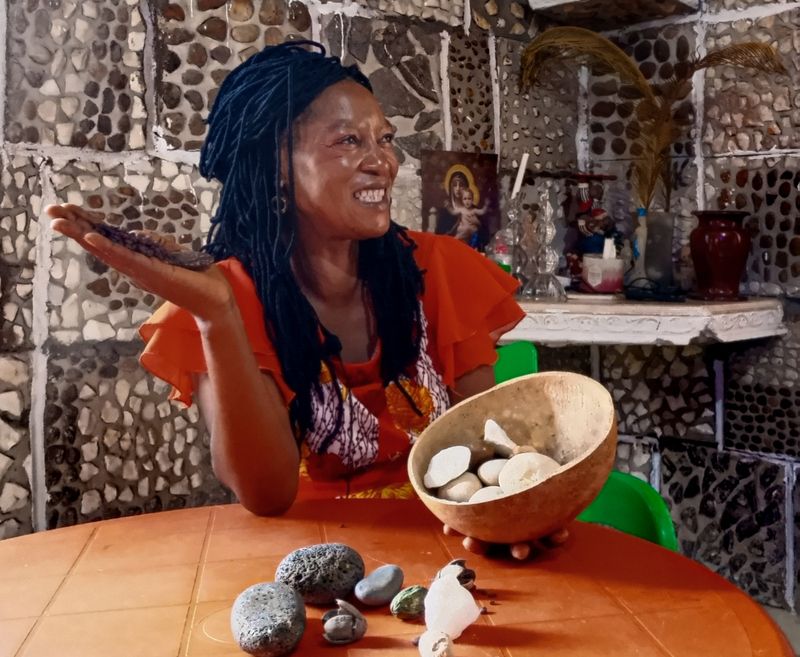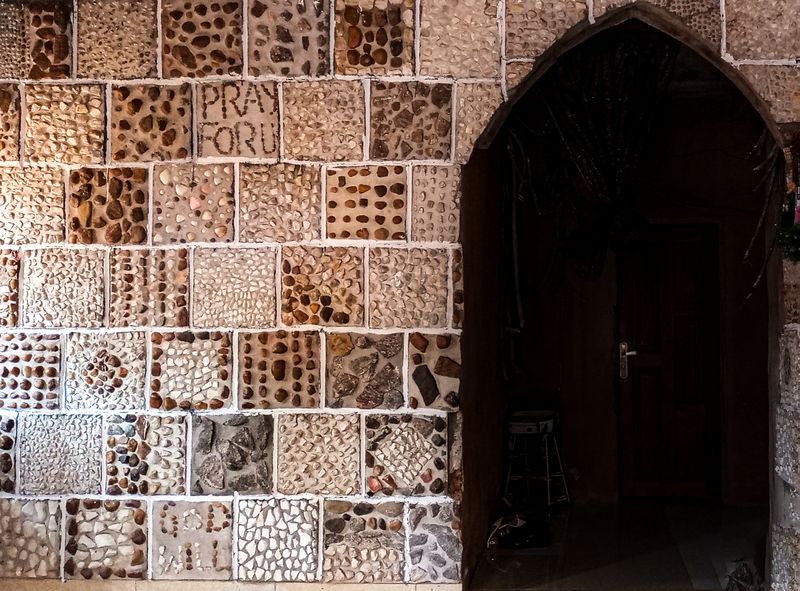News
Cameroonian Decorator Mahfuh Usman Transforms Homes in Yaounde with Exquisite Stone Tiles
Almost every morning at 6 a.m., 49-year-old Mahfuh Usman sets out for the Sanaga River, some 63 km from his home in Nkozoa, a locality in Yaoundé, Cameroon’s capital.
From the banks of the longest river in Cameroon, he gathers different types of stones, including granite, basalt, shale, agate, clear quartz, and pebbles. After filling several wheelbarrows, he loads them into his car and returns home. There, he sorts them, mixes a bag of cement with water and sand, and then measures it on a square mortar the size of a regular tile.
“Once the mortar of about 1.4-centimetre height is filled, I dock the sorted stones half inside, leaving half on the surface while the mixed cement is still wet. I will then pull out the mortar and leave the stones for about two hours to dry,” said Usman.
Usman has been an interior designer all his working life. But he never knew a time would come when he would use ordinary stones to cover the walls of the homes he was designing. That development was born out of a period of hardship.
When he lacked the money to purchase ceramic tiles imported from India and Germany after constructing his house a few years ago, living in a sun-dried brick house without finishings prompted him to think about something he had first seen on a trip to Brazzaville in 2007.
“I saw this stone tile design in somebody’s house in the Congo and loved it. That is why I wanted to do it for myself. I produce them just like they make cement blocks before I put them on the walls,” he said.
Unlike ceramic tiles, where the mined raw materials—clay and feldspar—are mixed with chemical additives before being fired, crushed, and glazed, Usman’s procedure is simple. It relies on local equipment and the sun for the drying process.
The stone tiles are clean, natural, and very flexible. Once installed on the wall, a piece can still be removed and its position changed without being destroyed.
He produces an average of 100 pieces daily with assistants but added, “If there is a huge demand, I can produce 200 pieces daily.”
This has generated a lot of income for him and his family. And even though it is still a new concept, Usman says many people love it, and the demand is fast improving.
Mbiydzenyuy Collette is one of Usman’s clients.
“With these tiles on the walls, I feel very comfortable. If there is too much sun outside and you are inside, you feel very cool, like you are living in a ventilated house where there is AC,” she said.
“When you look at these tiles, you feel like you are in an African home, like back in our village where we used to have grass houses. These tiles make you feel like you are back home,” she added.
The “African-made tiles,” as she calls them, make her feel proud to be an African.
“These homemade tiles, not the white man-made ones, make us feel beautiful. White people have created theirs, and we have also created ours,” Colette concluded.
Usman is also sharing this knowledge with the young people in his community to ensure continuity.
Eyong Amstrong, 33, a former welder, is one of Usman’s trainees. Eyong believes that this type of interior decor will be what many Cameroonians crave in the coming years, as it is natural and African-made.
Aside from producing their tiles from scratch, they also recycle used ceramic and broken tiles.
The naturally-made tiles are cheaper than those imported from Europe and Asia. A section of 600 mm by 600 mm is sold at XAF 1500 (US$2) compared to the imported tiles, which are sold at XAF 3,000 ($5).
Usman believes that if he can find funding, he will be able to secure machinery to produce the tiles in larger quantities, which will reduce the price even further.
The import of ceramic products into Cameroon was worth over XAF 43 billion (US$70.23 million) in 2018, according to the United Nations COMTRADE database on international trade.
During its 2023 budget, the country set aside XAF 137 billion (US$219 million) to help local companies produce products that were previously imported as part of an import substitution policy. Usman and many others like him are natural contenders for that support.
Story Credit: Njodzeka Danhatu for bird story agency






















